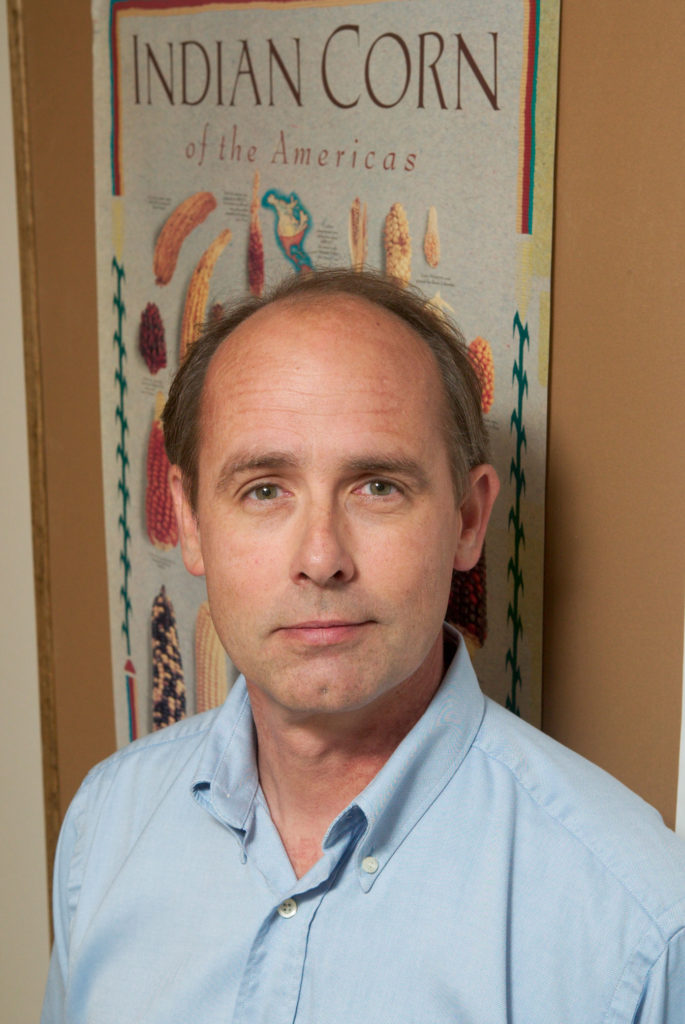Jeffrey L. Bennetzen, Norman and Doris Giles Professor of Molecular Biology and Functional Genomics, has been named winner of a John Simon Guggenheim Memorial Foundation Fellowship.
Bennetzen, who is also a and Georgia Research Alliance Eminent Scholar, was the winner of one of 190 Guggenheim Fellowships given to artists, scientists and scholars, with awards totaling $8.2 million. The successful candidateJeffrey L. Bennetzen, Norman and Doris Giles Professor of Molecular Biology and Functional Genomics, has been named winner of a John Simon Guggenheim Memorial Foundation Fellowship.
Bennetzen, who is also a Georgia Research Alliance Eminent Scholar, was the winner of one of 190 Guggenheim Fellowships given to artists, scientists and scholars, with awards totaling
$8.2 million. The successful candidates were chosen from a group of more than 2,600 applicants. Bennetzen’s Guggenheim was awarded for studies on genetic diversity and population structure in the parasitic weed Striga (witchweed) and its crop hosts in the landlocked West African nation of Mali.
“The Guggenheim Fellowship will allow me and my colleagues in Mali and France to investigate the host-parasite relationship between witchweed and the cereals it devastates in sub-Saharan Africa, primarily sorghum, pearl millet and maize,” said Bennetzen. “We hope to identify new sources of crop resistance to this parasitic plant, which is arguably responsible for as much malnutrition and death in Africa as HIV/AIDS, but has not been studied in any great depth because it is a problem only for the poorest of the poor in Africa and some parts of Asia.”
Since its establishment in 1925, the Guggenheim Foundation has granted more than $265 million in fellowships to almost 16,500 individuals. Scores of Nobel, Pulitzer and other prize winners have won fellowships, including Ansel Adams, Aaron Copland, Langston Hughes, Henry Kissinger, Vladimir Nabokov and Eudora Welty.
“I want to add my personal congratulations to Professor Bennetzen on this notable accomplishment. This honor is of great credit to him individually and to the university,” said UGA President Michael F. Adams.
Bennetzen, in the department of genetics, is a pioneer in the comparative analysis of plant genomes, especially in the contribution of transposable elements as generators of genetic diversity. Among his most notable discoveries was the identification of mechanisms of genome growth and genome shrinkages in flowering plants.
“My lab is interested in plant genome structure and evolution, especially the nature of chromosomal rearrangements and the contributions of transposable elements,” said Bennetzen. “We also study the relationship between evolved genome structure and gene function. We have long-standing interests in genetic diversity and its use in under-utilized crops of the developing world, the rapid evolution of complex disease resistance loci in plants and the co-evolution of plant/microbe and plant/parasite interactions, primarily in the soil.”
Bennetzen received his bachelor’s degree in biology from the University of California, San Diego in 1974 and his doctoral degree in biochemistry from the University of Washington in 1980. After earning his Ph.D., he spent one year as a postdoctoral fellow in a shared project between Washington University, Stanford University and the University of California, Berkeley. From 1981-1983 he was a research scientist at the International Plant Research Institute in San Carlos, Calif., before joining the department of biological sciences at Purdue.s were chosen from a group of more than 2,600 applicants. Bennetzen’s Guggenheim was awarded for studies on genetic diversity and population structure in the parasitic weed Striga (witchweed) and its crop hosts in the landlocked West African nation of Mali.
“The Guggenheim Fellowship will allow me and my colleagues in Mali and France to investigate the host-parasite relationship between witchweed and the cereals it devastates in sub-Saharan Africa, primarily sorghum, pearl millet and maize,” said Bennetzen. “We hope to identify new sources of crop resistance to this parasitic plant, which is arguably responsible for as much malnutrition and death in Africa as HIV/AIDS, but has not been studied in any great depth because it is a problem only for the poorest of the poor in Africa and some parts of Asia.”
Since its establishment in 1925, the Guggenheim Foundation has granted more than $265 million in fellowships to almost 16,500 individuals. Scores of Nobel, Pulitzer and other prize winners have won fellowships, including Ansel Adams, W. H. Auden, Aaron Copland, Langston Hughes, Henry Kissinger, Vladimir Nabokov, Linus Pauling, James Watson and Eudora Welty.
“I want to add my personal congratulations to Professor Bennetzen on this notable accomplishment. This honor is of great credit to him individually and to the university,” said UGA President Michael F. Adams.
Bennetzen, in the department of genetics, is a pioneer in the comparative analysis of plant genomes, especially in the contribution of transposable elements as generators of genetic diversity. Among his most notable discoveries was the identification of mechanisms of genome growth and genome shrinkages in flowering plants.
“My lab is interested in plant genome structure and evolution, especially the nature of chromosomal rearrangements and the contributions of transposable elements,” said Bennetzen. “We also study the relationship between evolved genome structure and gene function. We have long-standing interests in genetic diversity and its use in under-utilized crops of the developing world, the rapid evolution of complex disease resistance loci in plants, and the co-evolution of plant/microbe and plant/parasite interactions, primarily in the soil.”
Bennetzen received his bachelor’s degree in biology from the University of California, San Diego in 1974 and his doctoral degree in biochemistry from the University of Washington in 1980. After earning his Ph.D., he spent one year as a postdoctoral fellow in a shared project between Washington University, Stanford University and the University of California, Berkeley. From 1981-1983 he was a research scientist at the International Plant Research Institute in San Carlos, Calif., before joining the department of biological sciences at Purdue.
